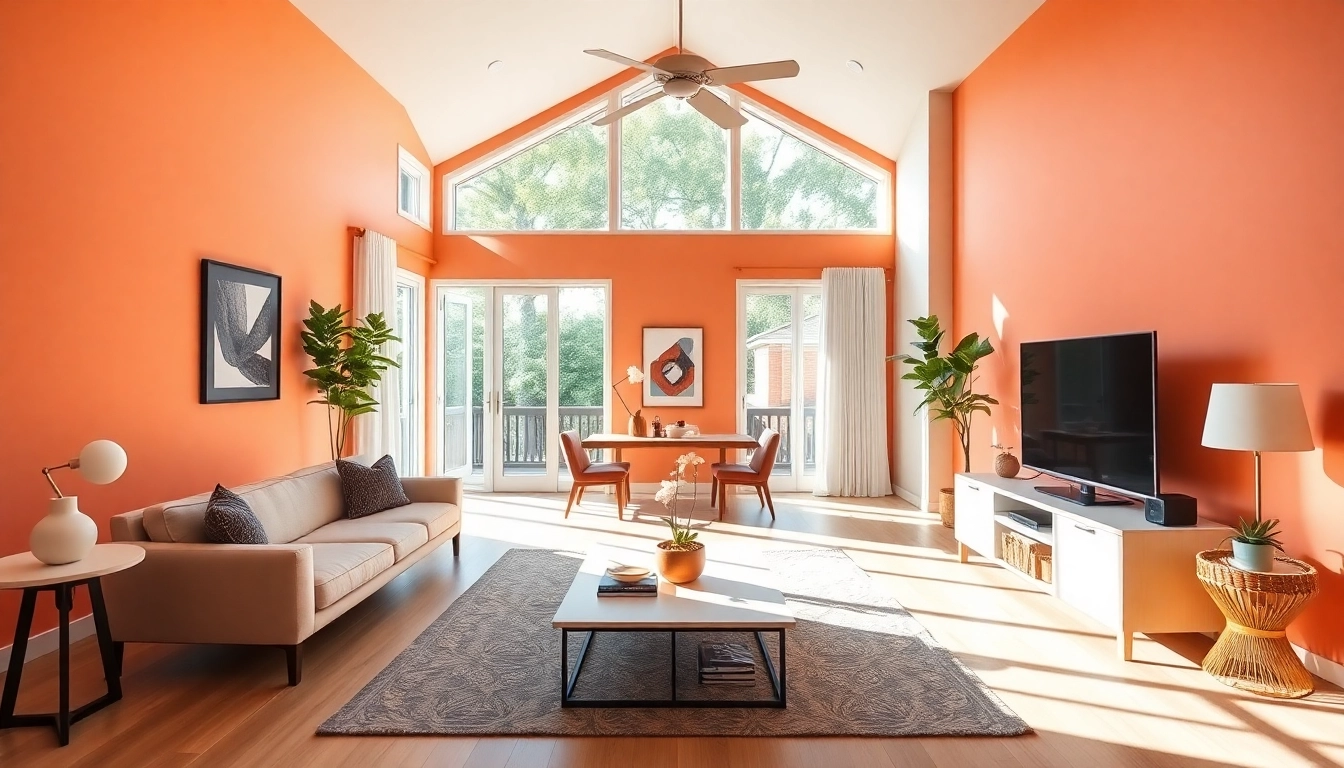Understanding Airbnb Properties for Sale
The rise of short-term rental platforms like Airbnb has transformed the real estate market, creating lucrative opportunities for investors. As the popularity of vacation rentals continues to surge, many are looking to capitalize on this trend by searching for an airbnb property for sale. This comprehensive guide will explore the nuances of investing in such properties, offering a clear blueprint for navigating this increasingly competitive landscape.
Current Market Trends
The short-term rental market has experienced significant growth over the past few years, driven primarily by changing travel preferences and the increasing acceptance of home-sharing. According to data from industry reports, U.S. Airbnb bookings reached record levels, with millions of listings worldwide, demonstrating solid returns for both hosts and investors. Cities that are highly sought after, like New York, Los Angeles, and Miami, see the highest demand. A 2023 report indicated that New York alone had over 10,000 properties available, with investors keen on unlocking profitable returns through strategic acquisitions.
Financial Considerations
When investing in Airbnb properties, it’s imperative to weigh financial aspects thoroughly. Purchasing costs, ongoing expenses (such as maintenance and utilities), and local regulations can heavily influence net profitability. A study by AirDNA highlighted that the average annual revenue from a successful Airbnb listing in metropolitan areas ranges between $30,000 and $50,000, varying widely based on location and property type. Understanding your financing options, including traditional mortgages, private loans, or cash purchases, is critical, as each comes with its own implications for cash flow and profits.
Types of Properties Available
Potential Airbnb properties span various types, including single-family homes, condos, and multi-family units. Each has unique benefits and challenges:
- Single-Family Homes: Typically provide a larger space and more amenities, appealing to families and groups. However, they often require a more significant initial investment.
- Condos: Generally less expensive than single-family homes and can offer services like security and maintenance, but may come with HOA fees that cut into profits.
- Multi-Family Units: Allow for multiple streams of income, as you can rent out different units on Airbnb. They require a comprehensive management strategy, however, as tenant turnaround can be higher.
Evaluating Profit Potential
Before investing in any property, assessing its profit potential is vital. Understanding the metrics that define success in the Airbnb business will enhance your decision-making process.
Key Metrics for Investment
Several metrics serve as benchmarks for evaluating profitability:
- Occupancy Rate: The percentage of nights a property is booked versus available. High occupancy translates to greater income.
- Average Daily Rate (ADR): The average revenue earned per booked night. Pricing strategy is crucial; overpricing can lead to reduced occupancy.
- Annual Revenue: A rough indicator of total income generated from short-term rentals over the year.
- Cash on Cash Return: Measures the return on investment based on the actual cash invested, a key metric for gauging overall profitability.
Researching Historical Performance
Understanding the historical performance of prospective investment areas can provide insight into expected revenues. Utilize platforms like AirDNA or Mashvisor to assess how similar properties have performed over time. Key data points include past occupancy rates, seasonal demand fluctuations, and rental price trends. By analyzing historical data, investors can make more informed predictions regarding future earnings.
Estimating Future Earnings
While past performance provides a baseline, projecting future earnings requires considering various factors:
- Location Trends: Is the area gaining popularity or seeing a decline? Areas undergoing redevelopment or revitalization may indicate future pricing increases.
- Market Saturation: The number of available rentals can impact your property’s competitiveness. Research how many comparable listings exist in your target area.
- Local Events and Attractions: Proximity to popular tourist spots or events can significantly boost occupancy rates and justify higher pricing.
Steps to Purchase an Airbnb Property
Once you’ve evaluated the financial aspects, the next step is the actual purchasing process. This involves several key actions.
Securing Financing Options
Your financing method is crucial to the success of your investment strategy. Traditional mortgages for investment properties usually demand higher down payments than primary residences—typically ranging from 15% to 25%. Private lenders, while potentially offering more flexible terms, might also present stricter repayment conditions.
Additionally, understanding possible government incentives for short-term rental properties may offer advantages worth exploring. Always consult a financial advisor or real estate expert to ensure you are leveraging the best financing options available to you.
Choosing the Right Location
Location is arguably the most critical factor in the success of an Airbnb property. Consider the following when choosing a location:
- Tourist Attractions: Properties near beaches, city centers, and popular landmarks often see more bookings.
- Accessibility: Ease of access via public transport or major highways can increase guest convenience and satisfaction.
- Regulatory Environment: Understanding local laws regarding short-term rentals can save you from legal troubles. Some areas have strict regulations or limitations on rentals.
Conducting Due Diligence
Prior to finalizing a property purchase, conducting thorough due diligence is essential. Inspect the property for necessary repairs, evaluate neighborhood conditions, and review the property’s history for any potential issues. Consider hiring professionals for home inspections to uncover hidden problems that may affect profitability.
Optimizing Your Airbnb Investment
After acquiring an Airbnb property, the focus shifts to maximizing its profitability through thoughtful optimization.
Enhancing Property Appeal
Aesthetic appeal plays a significant role in attracting guests. Key strategies include:
- Interior Design: Invest in modern, appealing furniture and tasteful decorations that enhance visitors’ experience.
- Quality Amenities: Consider upgrades such as high-speed internet, full kitchens, Smart TVs, and comfortable bedding to elevate the visitor experience.
- Photography: High-quality, professional photographs of your property can significantly impact booking rates. Ensure your listing showcases the best features of your home.
Effective Marketing Strategies
Marketing your property effectively is crucial to achieving high visibility and occupancy rates. Strategies can include:
- Dynamic Pricing: Use pricing tools that adjust rates based on demand to optimize earnings year-round.
- SEO Optimization: Ensure your listing uses relevant keywords and alluring descriptions that capture potential guests’ attention.
- Social Media Promotion: Leverage platforms like Instagram and Facebook to reach a wider audience. Consider paid ads targeting specific demographics.
Maximizing Guest Experience
Your success hinges on the guest experience. Create a welcoming environment by ensuring cleanliness, providing clear access instructions, and being responsive to inquiries. Collect guest feedback to understand what is appreciated and where improvements could be made.
Case Studies: Successful Airbnb Property Investments
Examining real-world case studies enables prospective buyers to learn from the experiences of others in the industry.
Profile of a High-Return Investment
Consider the story of a Chicago-based investor who purchased a two-bedroom condo in an up-and-coming neighborhood. By leveraging local tourism events and enhancing property appeal with high-end finishes, the investor saw an occupancy rate of 85% year-round, leading to an annual income of over $60,000 within the first year. This success stemmed from strategic marketing as well as valuable insights gained from comprehensive market research prior to the purchase.
Lessons from Industry Experts
Industry experts emphasize the importance of adaptability. As market dynamics shift, successful investors pay close attention to guest preferences and adapt their offerings accordingly—for instance, adding remote working capabilities to cater to the rising trend of digital nomadism. Continuous education through seminars and real estate forums allows investors to stay updated on best practices and emerging trends.
Common Challenges and How to Overcome Them
Despite the potential rewards, many investors may face the challenges of fluctuating occupancy, property damage, and regulatory shifts. Addressing these issues involves implementing comprehensive insurance coverage, maintaining open lines of communication with guests, and staying informed on local regulations. Developing a network of fellow investors can also provide insights and support for overcoming typical hurdles.



